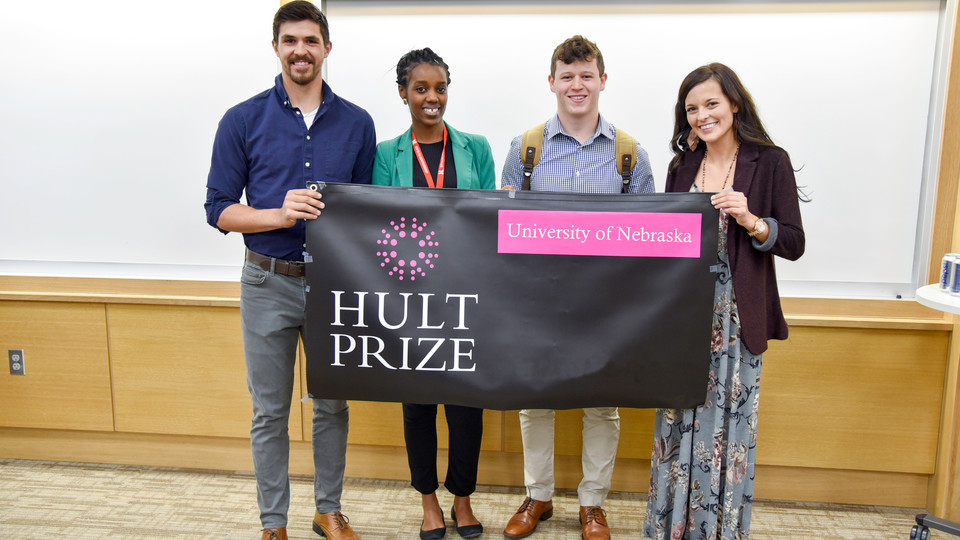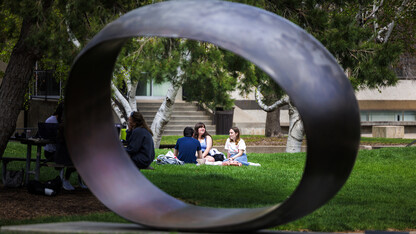· 5 min read
Huskers compete for chance to change the world

Competing for a chance at $1 million — and, more importantly, the opportunity to create a positive impact on the world — students at the University of Nebraska–Lincoln pitched business plans at the Nebraska Hult Prize Challenge Nov. 16.
The campus competition was the first time in Nebraska for the annual international contest, which challenges young people around the world to solve youth unemployment by proposing a business with potential to provide meaningful work for 10,000 youth within the next decade. More than 100 students, in teams of three or four, took the challenge and pitched plans in the first round of the global contest, held in Howard L. Hawks Hall.
Team Uhusiano, composed of Cheyenne Gerlach, a junior integrated science major from DeWitt; Matthew Brugger, a senior applied science major from Albion; and Eli Wolfe, a sophomore agribusiness major from Kearney; won the campus-qualifying round and the chance to compete in a regional final in Boston in spring 2019. They proposed a data-driven, human-based design to change how aid dollars are distributed in countries that receive U.S. relief. The idea originated after Gerlach spent a summer living in Mbita, Kenya, and talked with more than 100 local farmers and community members.
“From my own research, I noticed disconnect between the money and the individuals it should be reaching,” Gerlach said. “The money can get lost within government, distribution and you never really know where it will end up. What Uhusiano would do is connect these billions of dollars to people such as the ones I talked to in Kenya. Then they would actually see the impact and benefits of what that aid money could potentially be used for.”
Uhusiano is Swahili for “connection.”
By winning their campus-qualifying round, Uhusiano bypassed the normal application process to enter regionals, and will compete in Boston at one of 25 regional finals in the spring. The competition ultimately leads to presenting at the United Nations and a $1 million prize.
The Hult Prize competition came to Nebraska as the result of a partnership between Gloria Mwiseneza, a junior integrated science major from Kigali, Rwanda; the Center for Entrepreneurship; and the Husker International Business Club. Mwiseneza served as the Hult Prize’s campus director and coordinated the event with the aid of a committee she formed.
She knew the spirit of support at Nebraska would make the university a great place to host a Hult Prize campus competition.
“Watching the competition and students pitch their ideas was a dream come true for me,” Mwiseneza said. “Since I applied to the Hult Prize On Campus program, my hope was to empower the students at Nebraska to bring their ideas to light and for the winning idea to receive support. I am so grateful to have been supported to make all this possible.”
Recent Nebraska graduate Lizz Whitacre, a past winner of Center for Entrepreneurship’s pitching contests such as 3-2-1 Quick Pitch and New Venture Competition, served as a judge for the competition. Whitacre is chief executive officer of Pawlytics, a startup offering data management software for animal welfare organizations that can help save the lives of companion animals. Whitacre was impressed by the potential global impact of the business plans presented during the Hult Prize competition.
“The competition attracted a lot of new business ideas and students who haven’t pitched in the past,” she said. “Many of these ideas I heard were very well thought out, viable and would make positive change.”
Whitacre said it is “a very different experience” to judge a pitch contest than to pitch in one.
“As a judge, on a dime I need to think through all the potential barriers and solutions that the students had a month, sometimes more, to think through and prepare. It was especially important to think through the whole picture as a judge for a competition in which the winner could potentially go on to pitch to the United Nations and change the world.” said Whitacre.
Other finalists:
First Runnner-Up — Artworld, an incubator that allows talented artisans from all over the world to sell their arts. - Quincey Bernard, junior international business major from Port-au-Prince, Haiti - Deep Patel, junior business administration major from Francistown, Botswana - Elise Raymond, senior marketing major from Seward - Caleb Sneed, senior supply chain management and analytics major from Kansas City, Missouri
Second Runner-Up — PROgress, a company partnering with employers to give youth the opportunity to develop professional skills through a pathway program while being compensated. - Matthew Jung, senior marketing major from Arcadia, California - Kyle Kramer, sophomore economics and finance major from Lincoln - Marshall McDaniel, sophomore finance major from San Antonio, Texas - Katie Meredith, senior animal science major from Lincoln - Jeffrey Owusu-Ansah, junior international business major from Lincoln







